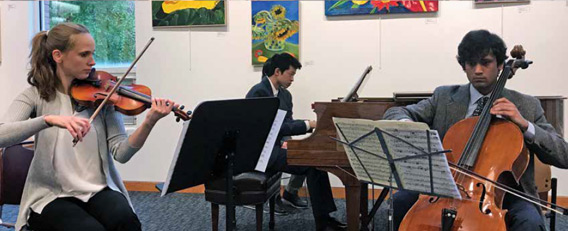Medical Students Launch Music at Bedside Program
On some days in the halls of Milstein Hospital Building, the silvery sound of a violin playing “Somewhere Over the Rainbow” floats in the air. On other days, it might be a Bach Cello Suite or holiday carols by a brass quintet. The music is live and the performances are thanks to the new Music at Bedside Program, a collaboration between VP&S students and palliative care professionals at NewYork-Presbyterian. The program’s goal is to soothe and entertain patients enduring painful conditions.
The Music at Bedside Program began to take shape in spring 2017, when VP&S Musicians’ Guild leaders wanted to create a program that combines their passion for music with patient care. The program is under the guidance of Craig Blinderman, MD, associate professor of medicine and director of adult palliative medicine at NYP/Columbia.
“Alleviating suffering is not simply achieved with finding the right medicine or plan of care but often happens with our touch, our words, our presence, and, I believe, with art,” says Dr. Blinderman. “Music is perhaps the most accessible art form, especially for those who are in pain and cannot concentrate on words or images. So the Music at Bedside Program fits in perfectly with the goal of palliative care.”
The program launched in the fall with 25 participants from the Musicians’ Guild under the leadership of violinist Stefanie Gerstberger’19 and cellist Shaheen Malick’20. This year, the guild is led by instrumental guitarist Andrew Sanchez’21.
Students play weekly in the cardiac medicine and neurosurgery units, where patients are recovering from surgery or suffer from chronic illnesses that keep them hospitalized for long stretches. In December, caroling groups visited several units, including cardiac medicine, rehabilitation, and bone marrow transplantation.
“The patients are always surprised to see someone with an instrument walk into their room,” says Mr. Sanchez.
Ms. Gerstberger likes to play her violin in the corridors. “I can reach more rooms, and patients come out and look for me,” says Ms. Gerstberger, who was playing the violin in another music therapy program when a patient woke up from a coma. “Music relieves stress for the entire unit: patients, families, nurses, and doctors. I really feel like I’m making someone’s day better. In the classroom, we are trained to become empathetic doctors, but nothing is as effective for feeling empathy as playing in the wards.”
The students also say taking part in the program has helped them as well. “Helping patients this way fosters a true sense of purpose,” says Mr. Malick. “Playing music in the hospital has a therapeutic aspect for us.”
— Rose Spaziani
- Log in to post comments


